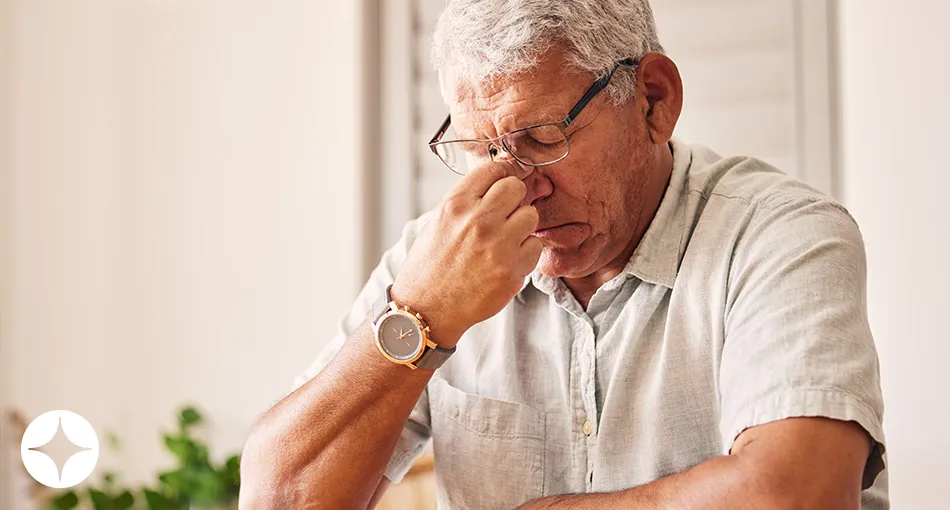
Around 6 million Americans1 have a sleep apnea2 diagnosis, although doctors believe the actual number of people with the condition to be substantially higher — approximately 30 million. Many people, including several famous names3, treat the potentially dangerous4 (if untreated) sleep disorder with sleep therapy5 equipment.
Despite the myriad reasons why quality sleep is essential for all-round health6, mood7 and longevity8, and despite the many benefits of sleep therapy9, research indicates that treatment adherence10 is concerningly low. Indeed, experts estimate that between 33% and more than 50% of people prescribed CPAP therapy discontinue treatment11. Not only does this negatively affect daytime wakefulness, mood and energy levels, but it also has wider health impacts. For example, researchers found links between sleep apnea and stroke12. Moreover, individuals who experience a stroke are highly likely to develop sleep apnea.13 This article examines such connections and provides tips for getting vital restorative sleep, which can help reduce the risk of stroke14.
Connections Between Sleep Apnea and Stroke
Sleep apnea can lead to hypertension15, commonly known as high blood pressure, which is a risk factor for stroke. Indeed, experts believe that hypertension is a major cause of around half of all strokes — it is the largest single risk factor16 for stroke. The sleep disorder also reduces blood flow to the brain17, which is another contributing factor to stroke.
Additionally, many people with sleep apnea have a heart defect, known medically as a patent foramen ovale18, which can remain undetected for many years. Such a defect increases the likelihood of an individual having a stroke. Approximately 30-40% of people19 who experience an unexplainable stroke have this heart defect.
Sleep apnea doesn't only increase stroke risk; those who have a stroke are likely to develop sleep apnea. This can lead to various additional health issues, as well as increasing the risk of suffering future strokes.
Tips for Combating Sleep Apnea and Stroke
Although the links between sleep disorders and stroke are worrying, people can take several steps to lower risks.
- Individuals with a sleep apnea diagnosis should ask their doctor to check for heart defects. Treating any defects can greatly reduce the chance of stroke.
- Those diagnosed with sleep apnea should always follow sleep therapy routines, even when away from home20. Investing in travel accessories can promote comfort and convenience, making adherence more likely.
- People who've experienced a stroke should investigate the possibility of resulting sleep apnea, and treat the condition accordingly.
- Exercising daily can both promote better sleep21 and ward off strokes22.
- Maintaining good sleep hygiene23 practices makes a good night's rest more likely.
- Changing dietary habits24 can have positive impacts on health, reduce stroke risks and boost sleep.
Anyone concerned about sleep apnea and/or stroke risk should consult with a physician and follow professional medical advice.
References
- American Medical Association – What doctors wish patients knew about sleep apnea
- Mayo Clinic – Sleep apnea
- SoClean – Stars Speak Up About Sleep Apnea
- Johns Hopkins Medicine – The Dangers of Uncontrolled Sleep Apnea
- SoClean – Our Top Hacks for Improving Your Sleep Therapy Experience
- SoClean – 5 Health Benefits of Sleep
- National Library of Medicine – Relationship Between Sleep Quality and Mood: Ecological Momentary Assessment Study
- SoClean – New Research: Sleep Well to Live Longer
- National Heart, Lung and Blood Institute – CPAP
- National Library of Medicine – Trends in CPAP adherence over twenty years of data collection: a flattened curve
- KFF Health News – I'm A CPAP Dropout: Why Many Lose Sleep Over Apnea Treatment
- National Library of Medicine – Obstructive sleep apnea and stroke
- National Library of Medicine – Early diagnosis and treatment of obstructive sleep apnea after stroke
- National Heart, Lung and Blood Institute – What Is a Stroke?
- Mayo Clinic – Sleep apnea
- Stroke Association – High blood pressure
- National Library of Medicine – Altered Resting Cerebral Blood Flow in Obstructive Sleep Apnea: A Helpful Change or Not?
- AHA Journals – Patent Foramen Ovale Closure in Obstructive Sleep Apnea Improves Blood Pressure and Cardiovascular Function
- Cleveland Clinic – Patent Foramen Ovale (PFO)
- SoClean – Sleep Well Anywhere This Summer: Tips for Traveling with Sleep Therapy Equipment
- National Library of Medicine – The Effect of Physical Activity on Sleep Quality and Sleep Disorder: A Systematic Review
- National Library of Medicine – Exercise for stroke prevention
- SoClean – Everything You Need to Know About Sleep Hygiene
- National Library of Medicine – Stroke and Nutrition: A Review of Studies




